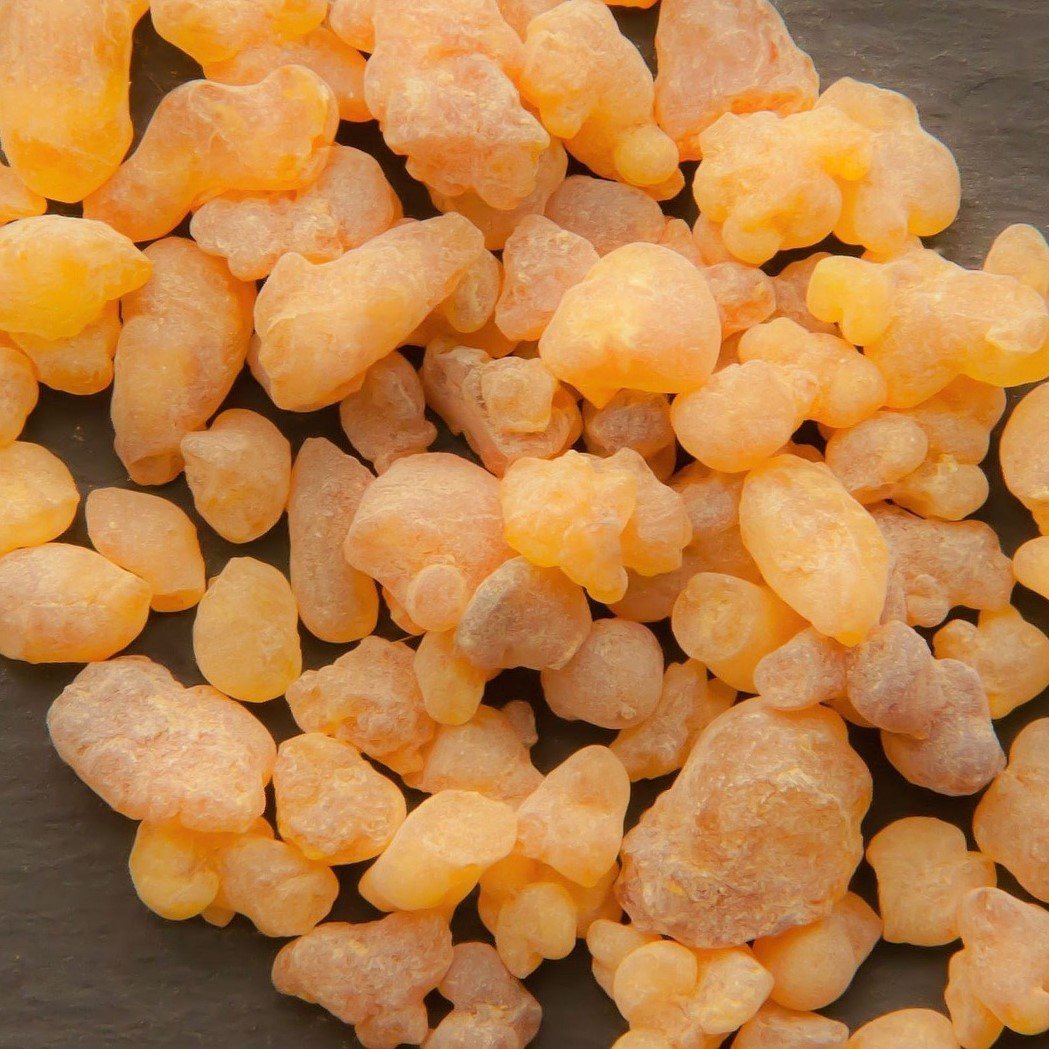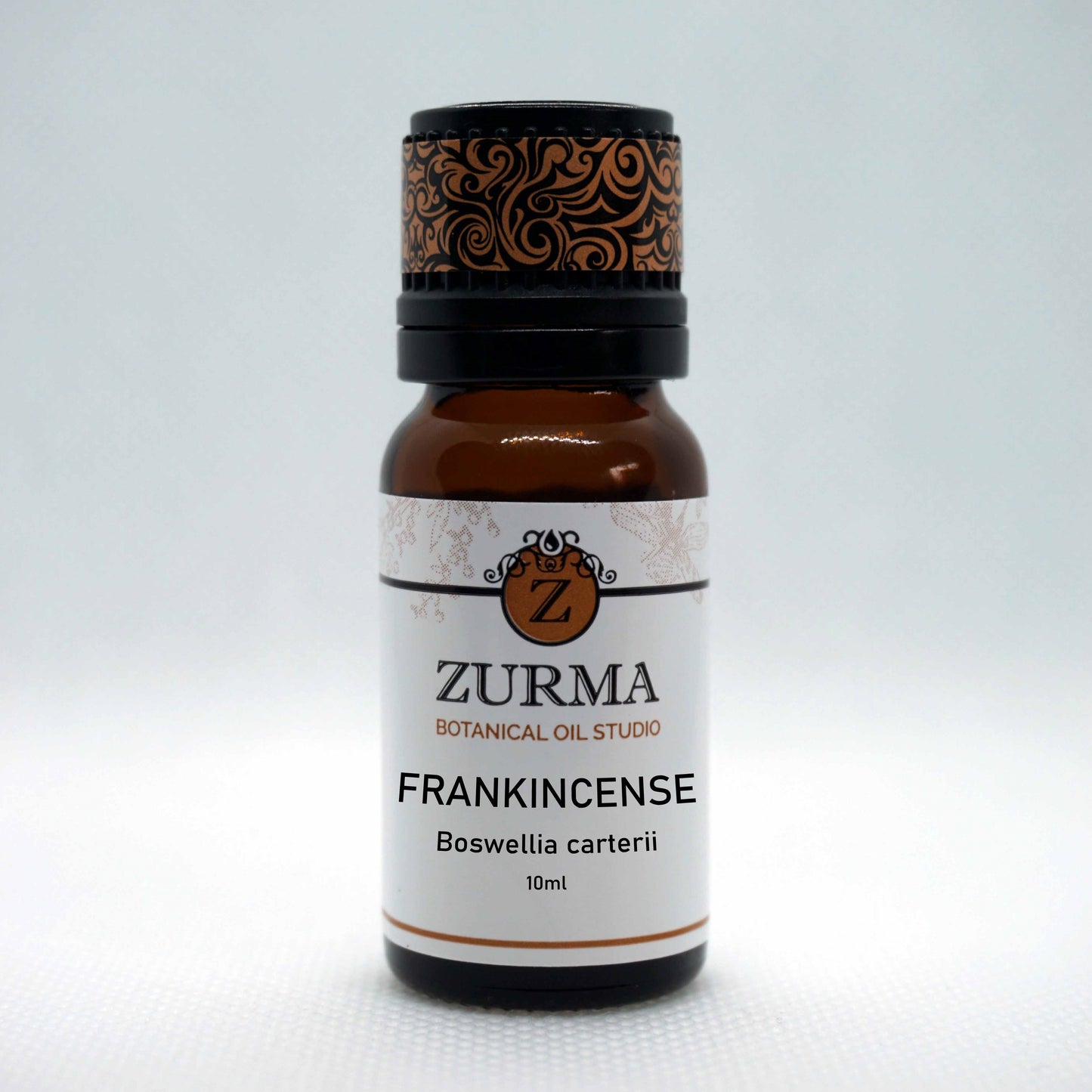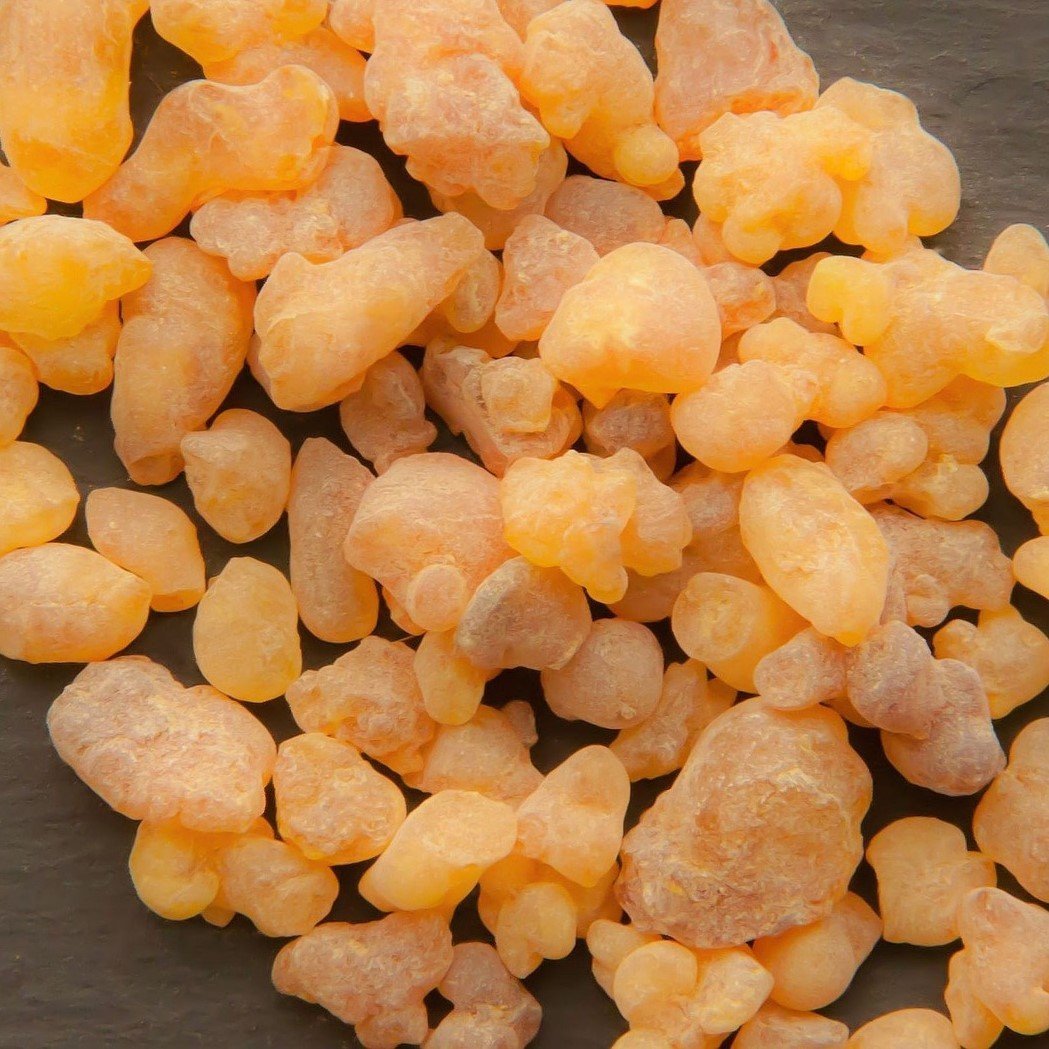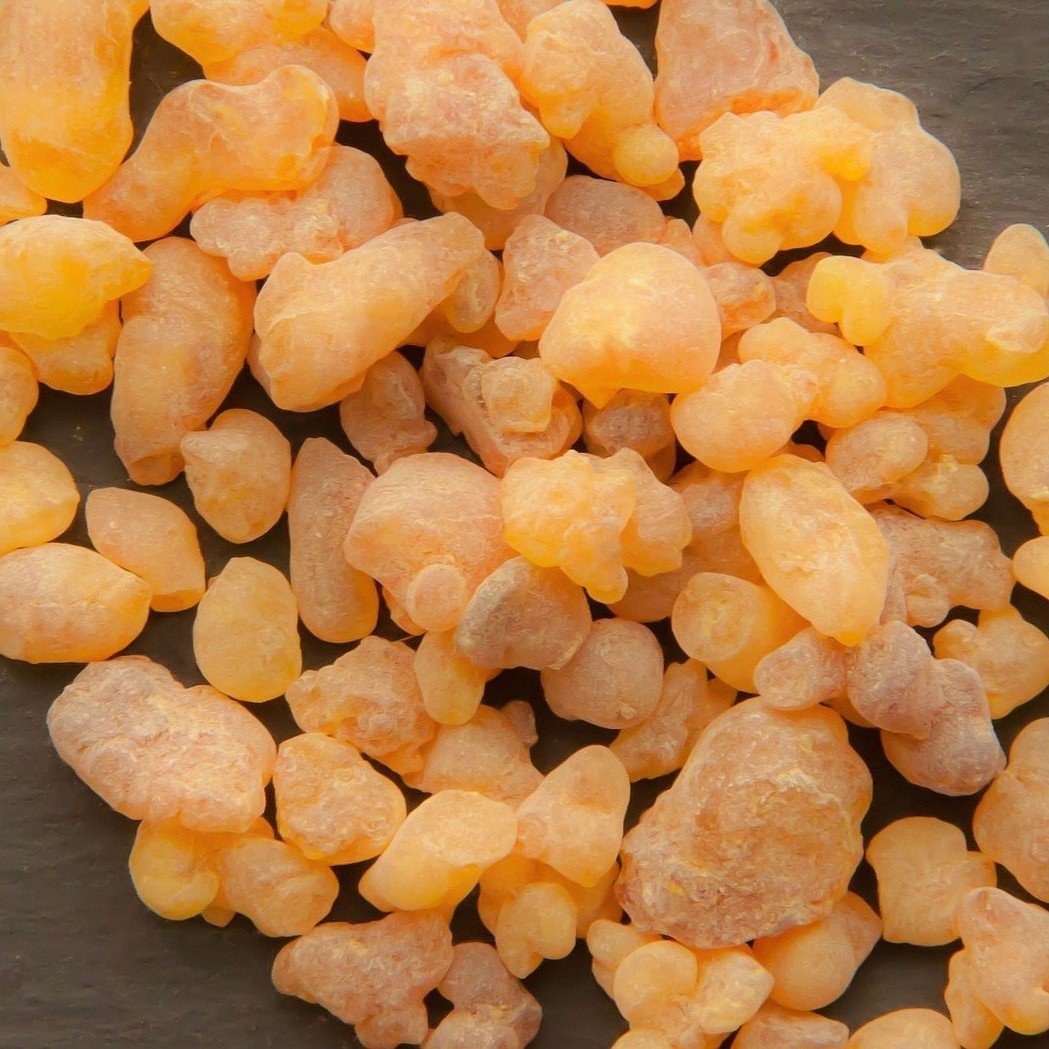Frankincense Carterii Essential Oil
Frankincense Carterii Essential Oil
Couldn't load pickup availability
Boswellia carterii essential oil, commonly known as Frankincense oil, is a highly regarded and widely used aromatic substance in aromatherapy. Obtained from the resin of the Boswellia carterii tree, which is native to regions in Africa and the Arabian Peninsula, this precious oil has been used and valued since ancient biblical times for its health, cosmetic, aromatic and spiritual applications. Its rich, woody, and slightly sweet aroma makes it a popular choice for helping with various emotional, physical, and spiritual uses, earning its reputation as a versatile and valuable essential oil in modern aromatherapy.
Botanical Name: Boswellia carterii
Part Typically Used: Resin
Method of Extraction: Steam Distilled
Class: Monoterpene
Perfumery Note: Top
Country of Origin: East Africa
Typical Main Constituents
alpha-Pinene - 50%
Limonene - 9%
alpha-Thujene - 7%
Octyl acetate - 6%
beta-Pinene - 4%
beta-Caryophyllene - 3.5%
Sabinene - 3%
Myrcene - 2%
Description: Pale yellow to greenish oil. Fresh sharp top note with sweet, rich, warm- balsamic undertone.
Actions: Anti-inflammatory, Antiseptic, Astringent, Expectorant, Digestive, Carminative, Diuretic, Uterine, Emmenagogue, General tonic, Sedative, Vulnerary.
Special use: Frankincense has the ability to slow down and deepen the breath which makes it useful for prayer and meditation.
Blends Well With: Myrrh, Sandalwood, Bergamot, Jasmine, Tea tree, Yarrow, Grapefruit, Rose, Neroli, Rosemary and Lavender.
Aromatherapy / Home Use
Nervous System: Has the ability to induce relaxation and alleviate stress and anxiety by calming the mind and reducing feelings of tension, promoting a sense of tranquility and inner peace.
Meditation and Spiritual Practices: Boswellia carterii oil has a profound history of use in spiritual and meditative rituals. Its grounding and centering properties help enhance focus and mindfulness during meditation sessions. The aroma of Frankincense is believed to uplift the spirit, promote introspection, and create a sacred ambiance, supporting spiritual exploration and self-reflection.
Emotional Support: Aromatherapy uses Boswellia carterii essential oil for its calming and balancing effects on the nervous system as it can help alleviate feelings of sadness, grief, and emotional exhaustion, providing comfort and solace during challenging times.
Respiratory Aid: Soothes airways, aids breathing, useful for colds and flu.
Anti-Inflammatory and Pain Relief: This oil is used for managing joint and muscle discomfort. Blended in a nut/seed oil it can be applied topically to help soothe sore muscles, reduce inflammation, and support joint health.
Skin Care: Highly valued in skincare due to its positive rejuvenating and balancing effects on the skin.
Cognitive Function and Memory: Some studies suggest that this oil may have positive effects on cognitive function and memory by enhancing mental clarity, focus, and concentration, making it useful for studying, working, or engaging in activities that require cognitive alertness.
Safety Data: Non-toxic, Non-irritant, Non-sensitizing.
Contraindications
-
Pregnancy and breastfeeding: Frankincense essential oil should be avoided during pregnancy and breastfeeding.
-
Allergies: Some individuals may be allergic to frankincense or other ingredients in the oil, so it's important to test a small amount of the oil on the skin before using it.
-
Interaction with Medications: Frankincense essential oil may interact with certain medications, such as blood thinners, so it's important to consult a healthcare professional before using it if you're taking any medications.
-
Topical use: Frankincense essential oil should not be applied to broken or irritated skin.
-
Asthma: People with asthma should avoid inhaling Frankincense essential oil as it may cause an allergic reaction or aggravate the asthma symptoms.
FAQ: Do Frankincense essential oils contain Boswellic acid? Despite the hype by some people Frankincense essential oils do not contain Boswellic acid. In reality it is not possible for any type of steam distilled Frankincense essential oil to contain Boswellic acid. For more information, read Frankincense Oil and Cancer in Perspective by essential oil expert Robert Tisserand.
Zurma Essential Oils - Highest Quality Pure and Natural
At Zurma we go to great lengths to ensure that we only sell the highest quality pure and natural essential oils. We have searched the world for the best essential oils. Our in-house quality control system ensures that this high standard is maintained for all our essential oils. Every essential oil comes with a Certificate of Analysis (COA) and Gas Chromatograph/Mass Spectrometer (GCMS) test to confirm that they are genuine and authentic essential oils containing their correct active constituents.
The only exception to this is with the New Zealand small scale essential oil producers we buy direct from e.g., Lavender, Mānuka, Kānuka, Tea Tree etc. This is because we know and trust these growers who distil their own essential oils.
Finally, all essential oils have to undergo our own in-house smell, appearance and feel test and if they are not up to our high standards, we simply send the product back to the supplier. Based on this quality control process we believe that the 100% Pure and Natural essential oils that Zurma supplies to our customers are of the highest quality and are excellent for use in aromatherapy.
General Essential Oil Safety Recommendations
Do not take essential oils internally unless under advisement by a qualified medical professional.
Do not use essential oils undiluted on the skin. It is always best to try a small patch test first of the diluted essential oil.
People who are pregnant or have serious medical problems are advised to consult with a qualified aromatherapy practitioner before using essential oils.
Use extreme caution when using essential oils with children. It is safest to consult with a qualified aromatherapy practitioner before using essential oils with children.
General Disclaimer
The product information provided on this website is intended for educational purposes only. The information provided is not considered to be complete and is not guaranteed to be accurate. The information contained in this website is not intended to be sufficient to provide diagnosis and/or treatment of medical conditions. It is recommended that treatment of serious health conditions be done with the help of a trained qualified medical practitioner.
Share




Use it for so many things, beautiful smell, great quality as always
Frankincense has powerful healing properties. I initially used it for my eye sight and now added it to my anti inflammatory ointment and my home made moisturiser. It is wonderful to use Zurma’s top quality essential oil
To ensure our essential oils are not diluted to adulterated, Zurma Essential Oils undergo rigorous testing, including Certificate of Analysis (COA) and Gas Chromatography-Mass Spectrometry (GCMS) analysis. This meticulous testing process guarantees the purity, potency, and authenticity of our oils.




